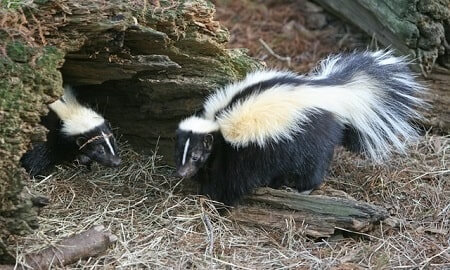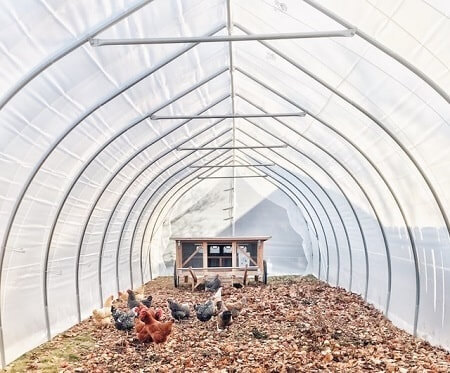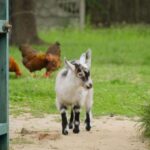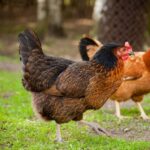Depending on where you live, there are a number of possible predators that can threaten your chickens and their eggs.
But what about skunks? Sure, they smell bad, are a nuisance, but do skunks eat chickens? Will they harm your flock if they can get access to them?
Skunks have been known to attack and even kill chickens on occasion, yes. They are more likely to harm or kill chicks or small chickens, and will almost certainly feed on eggs if they can get into their coop.
Table of Contents
Do Skunks Kill Chickens?
Skunks are cute, furry little black and white animals. Well, at least I think they’re pretty cute.
What is not cute about them, however, is the foul smell they’re famous for and their sharp, dangerous teeth that you’ll see if you ever get close enough to one.
Skunks aren’t that high up in the food chain when it comes to predators though.
They are nocturnal and will come out at night to find easy prey like small mammals, reptiles, and insects, and they also eat some vegetation.
The smell of feed, chickens, and live animals will draw them to a coop - and often does. If they are able to get in, which usually means digging under a fence, they will take advantage of anything they find inside.
It’s unlikely they will deliberately attack and kill a chicken. Unless it’s a small bantam or a chick, that is. Skunks are not aggressive for the most part, they are more of a scavenger and opportunist.
There have been incidents of skunks killing chickens though, so it’s something to be aware of. Not to mention that they are going to spray their foul smell around in all the chaos.
Which, if you’ve never smelled a skunks smell in person, I’m not sure if you’re fortunate, or if you’re missing out on knowing just how bad it is!
Do Skunks Eat Chicken Eggs?

Yes, skunks will eat chicken eggs. Along with snakes, small rodents, and some other small predators, they would happily feed on eggs and leave your chickens alone.
If a chicken catches the smelly egg thief in the act, that’s when there are going to be some problems.
Hens are protective over their eggs, and rightly so! Roosters are protective over their hens, and rightly so!
Any predators caught sneaking into a coop in the night is going to cause a ruckus. If they go undetected, however, you might find the evidence of broken shells and spilled eggs in the morning.
This can become distressing for chickens. It can even cause them to break and eat eggs themselves if they get a taste for the spilled eggs. It’s something you need to put a stop to as soon as possible.
How Do You Keep Skunks Away From Chickens?
There are two main things you need to know about skunks if you’re going to make your coop skunk-proof;
- The first is that they are about the same size as a domestic cat, so they’re able to squeeze through small holes
- The second is that they aren’t that good at climbing, but they’re great at digging
This means you’re going to need to secure any possible holes that can be used as entry points. As well as digging your fencing at least 2 feet deep if you want to be sure those pesky skunks can’t get in.
Which, I will add is great practice anyway for an all-around secure coop that’ll keep all kinds of predators at bay.
Here are some tips to help you deter skunks and increase the security on your coop:

Securing the Perimeter
As I mentioned above, blocking access to their coop is your main priority. If they can’t get in, they can’t steal eggs and attack your chickens.
It’s up to you how you’re going to do this and depends on what type of coop you have. Ideally, you should dig your perimeter fencing into the ground a couple of feet as burrowing under is a skunk’s preferred method of entry.
Even if they can’t then get into the coop, having a skunk walking around and potentially spraying their foul smell is the last thing you want to be greeted with in the morning.
Remove Any Food Overnight
Skunks are nighttime scavengers. They will be attracted to an area by the smell of any form of food. This means chicken feed, table scraps, an open bin, and so on.
Chickens do not need food overnight, and it’s good practice to secure any food to stop all kinds of scavengers. I recommend doing so if you’re not already.
Consider Security Lights
Motion sensor lights are also a good deterrent against a few types of predators. Animals do not like creeping up under the cover of darkness, only to find themselves exposed in the middle of a well-lit area.
It’ll also help you see what’s going on from a distance. As well as providing light if you ever have to go out in the night.
Set a Skunk Trap
This might sound a bit drastic to some, but for some people I know catching a predator is the first thing to do.
Skunk traps are basically large cages, similar to what you’d use to catch a rodent. It’s best to talk with your local authorities to find out if there are any local laws or procedures regarding trapping and releasing skunks.
Oh, and be wary of a scared or panicked skunk. Spraying their awful smelling liquid is one of the ways they defend themselves. Wear gloves and a mask!
Some Possible Natural Solutions
There are some natural solutions and home remedies that I’ve heard some people having success with.
Pest control companies like Terminix say they’re not that effective, however, as they’d rather get in there and remove the critters.
Still, if you like trying home remedies, I suggest using a strong-smelling pepper like cayenne pepper or hot chili pepper. Also, strong citrus scents are supposed to be good deterrents.
Basically, the kinds of strong-smelling substances that offend most small animals with a good sense of smell might make them turn the other way.
In Summary
There are a number of potential predators that would love to get their claws or teeth into chicken’s and their eggs.
Skunks can definitely be a problem given the chance, so I recommend taking some of the steps above if you know they’re present in your area.
It’s always better to be safe than sorry. Especially with this small black and white critter that is capable of spraying a foul-smelling liquid.
Take it from me - someone who has smelled a skunk - you don’t want these little guys hanging around your yard!
Resources
Image credits - Skunk photos by Bryan Padron, and chickens by Sophie Mikat on Unsplash
Facts about skunks - LiveScience.com
How to Keep Skunks Away - Terminix.com




